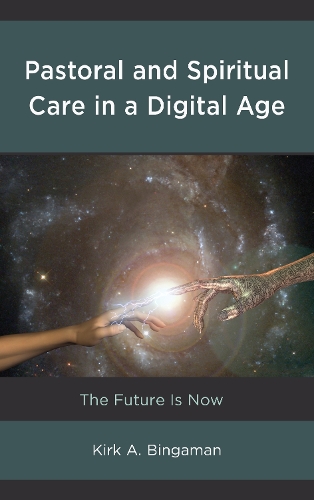
Pastoral and Spiritual Care in a Digital Age: The Future Is Now
(Hardback)
Publishing Details
Pastoral and Spiritual Care in a Digital Age: The Future Is Now
By (Author) Kirk A. Bingaman
Bloomsbury Publishing PLC
Lexington Books
15th October 2018
United States
Classifications
Professional and Scholarly
Non Fiction
Religious social and pastoral thought and activity
Psychotherapy: counselling
Spirituality and religious experience
Theology
253
Physical Properties
Hardback
150
Width 160mm, Height 231mm, Spine 18mm
404g
Description
Artificial intelligence (AI) is changing what it means to be human. Given our increasing merger with machines, we have therefore entered uncharted territory and an era of unprecedented change. For pastoral and spiritual care providers, religious faith communities, clinical practitioners, and educators, immediate theological reflection is needed, focusing on the potential existential threatandopportunity, and what will constitute human personhood in an age of technological enhancement. Preserving our humanity in a digital age will require intentional focus on strengthening the neural circuitry associated with focused attention, mindful and compassionate awareness, and social and relational intelligence, even as we put to good use the emerging digital technologies.
Reviews
How do I overcome my FOMO My Fear of Missing Out when drowning in the flood of social media, texting, robotics, and artificial intelligence Kirk Bingaman answers: pause to meditate, contemplate, and rewire the brain. This is soul-saving advice! -- Ted Peters, co-editor of Theology and Science
Bingaman compellingly argues for contemplative spiritual practices as a primary strategy for evolving with the digital agespiritually, cognitively, and communally. He argues convincingly that contemplative practices in a digital age will preserve and extend what is most precious about our humanityour capacity for attentional depth that fosters relational and compassionate awareness. Religious leaders and spiritual caregivers have distinctive resources in their traditions contemplative spiritual practices for helping themselves and the people in their care experience spiritual wholeness rather than fragmentation in the digital age. -- Carrie Doehring, Iliff School of Theology
Kirk Bingaman has written an important book because technology is here to stay. Computer technology extends nature into new forms of information and we have yet to understand the impact of informational flow on our spiritual lives. How do we prioritize our lives in a techno-driven age How do we prevent brain fatigue and information burn-out when we are completely dependent on our devices Bingaman shows that pastoral care must now include techno-spiritual care and he offers sound advice based on the wisdom of the past: slow down, focus and be attentive to the inner presence of God. This book opens a novel window on caring for the technological person and offers valuable insights that can help to navigate spirituality in the 21stcentury. -- Ilia Delio, OSF, Connelly Endowed Chair in Theology, Villanova University
Author Bio
Kirk A. Bingaman is associate professor of pastoral care and counseling at Fordham University.
